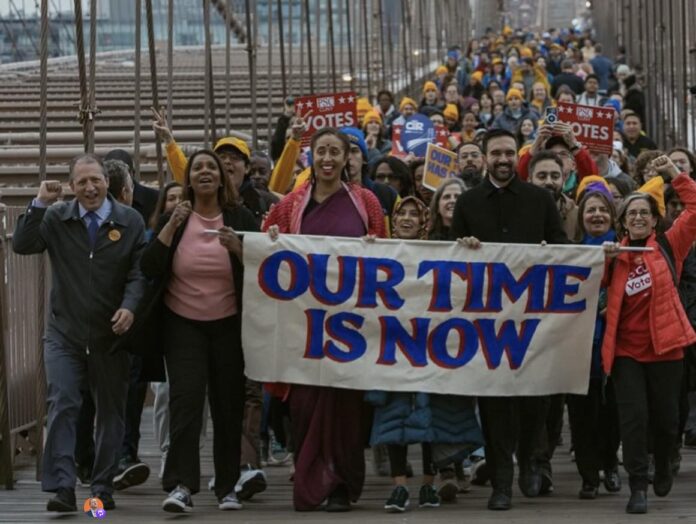With over 50% of the vote and the highest turnout in decades, Zoran Mamdani was elected Mayor of New York—the largest city in the US—on November 4. His victory is nothing short of a political earthquake. He managed to win despite facing a massive coalition of interests: a $34 million campaign financed by the city’s ruling elite, supported both by the Democratic Party establishment and by Donald Trump.
Who is he?
Mamdani, 34, is an immigrant from Uganda, a Muslim, and a member of the Democratic Socialists of America (DSA). His election platform advanced a series of radical proposals aimed at the city’s working class and oppressed:
- A rent freeze on roughly half of all rental apartments—around 1 million out of a total of 2 million—where the municipality has the authority to regulate prices.
- The construction of 200,000 new publicly subsidized apartments.
- Fast and free bus service throughout the city.
- Universal and free child care for all residents.
- Municipal grocery stores in every borough offering affordable, quality food.
To fund this program, his campaign proposed raising the corporate tax rate to 11.5% and introducing a 2% tax on the richest 1%—those with annual incomes over $1 million.
These demands, combined with Mamdani’s class-based rhetoric—he spoke openly about the struggle of the poorest and most oppressed against the rich—generated an electrifying atmosphere and won him unprecedented popular support.
The campaign and “realism”
The most striking feature of Mamdani’s campaign was its mass mobilization of volunteers. Tens of thousands went door-to-door and made phone calls to discuss the elections with residents. Altogether, more than 90,000 volunteers participated, knocking on 1.6 million doors during the primaries alone!
This enormous mobilization clearly shows the potential of radical ideas to inspire people willing to dedicate time and energy to bring them to life. In Trump’s America—amid the rise of the Far Right—it is evident that a mass layer is searching for radical political expression. When the Left finds a way to connect with this mood, it can counter or weaken the Far Right’s appeal.
Mamdani’s victory is a major blow not only to Trump and the Republicans but also to the Democratic Party establishment—the clique that dominates the party and, while posing as progressive, is primarily concerned with maintaining its privileges rather than promoting social change. It is the same establishment that blocked Bernie Sanders from becoming the Democratic nominee, even though he was the only candidate likely to defeat Trump, and instead imposed the “lame ducks”—Hillary Clinton in 2016, and Biden and then Harris in 2024—handing Trump victory on a plate.
Following Harris’s defeat by Trump, Mamdani’s election delivers another nail in the coffin of the argument that the Left must become “more moderate,” move “toward the center,” and embrace “realism” in order to win majorities.
The challenges ahead
In the coming days, we will publish more detailed analyses on the challenges and dilemmas Mamdani will face as a left-wing mayor of the richest city in the richest country in the world.
For now, it is worth noting that several of his proposed measures are not under the mayor’s sole authority, but fall within the jurisdiction of the State of New York (controlled by moderate Democrats) and the federal government (controlled by Trump, who has already threatened to cut funding).
The Democratic establishment, Trump, the city’s millionaires, and the largest police department in the US—a known stronghold of the Far Right—will likely unite to block any radical initiatives by the new city administration.
The only force capable of resisting these attacks is the mass mobilization in an organised way of the working people—the same people who brought Mamdani to victory.
Harnessing this potential will be the central challenge of the period ahead. Yet this task is complicated by Mamdani’s continued membership in the Democratic Party and his avoidance of the perspective of revolutionary changes—the only means through which such a confrontation can be successfully waged. By contrast, compromise leads to subordination and mass disillusionment.
It is on these issues that Mamdani will ultimately be judged in the period to come.



